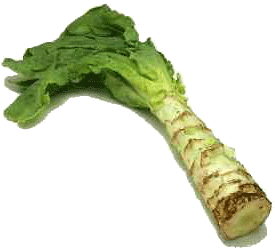|
 |
|
| |
 |
 |
| Home > Lifestyles > Food & Diet > General Dietary Restraints and Taboos |
 |
 |
 |
|
| |
General Dietary Restraints and Taboos
The food and beverage we consume daily - whether it is of hot or cold properties - should be chosen according to a person's constitution and condition. Inappropriate intake will lead to extreme energy excess inside the body and disturb the yin yang balance. A well-planned diet promotes the body to function optimally, and ensures a full recovery from diseases. The Chinese have a long history in dietary practice and have accumulated much experience in taboos. Some of the common contraindications are summarized below.
General food and food incompatibilities
| |
Should not be eaten with: |

Crucian Carp

Garlic chives

Stem lettuce
|
| Pork |
Liquorice root, buckwheat, crucian carp, yellow soy bean, raw coriander, lamb liver, quail, field snail |
| Chicken |
Plum, mustard, glutinous rice, carp, rice field eel |
| Beef |
Garlic chives, chestnut |
| Rabbit meat |
Mustard, raw ginger |
| Mutton |
Plum, buckwheat, vinegar |
| Lamb liver |
Pork, bamboo shoot |
| Venison |
Catfish |
| Egg |
Soy bean milk, raw spring onion, sweet potato, rabbit meat, carp |
| Milk |
Raw fish, spinach, sour food |
| Crab |
Persimmon, loach, celery, pomegranate, mulberry, sweet potato |
| Crucian carp |
Mustard cabbage, pig liver, taro |
| Carp |
Taro, salty food, egg, pork, chicken, pumpkin |
| Plum |
Egg, mackerel, chicken, duck, duck egg, honey |
| Persimmon |
Crabs, sweet potato, egg, Chinese tea, wine |
| Spinach |
Bean curd, cucumber, rick filed eel, cheese |
| Celery |
Cucumber, clams, crabs |
| Gingko fruit |
eel |
| Pumpkin |
Carp, crab, chilli peppers, mutton, sea fish, shrimp, chicken |
| Corn |
apricot kernel |
|
According to traditional Chinese medicine (TCM), adverse effects that result from these combinations may include an accumulation of metabolic wastes, relapse of disease, skin rashes or even stagnation of qi (vital energy).
Dietary restraint in certain health conditions
A basic principle in TCM is that when a person suffers from a certain disorder or takes medication, he should avoid certain foods. For example, a person suffering from generalized body swelling should refrain from salty food, and a person suffering from diarrhea should avoid a greasy diet. TCM physicians usually advise their patients to consider the following aspects:

|
During a recovery stage or just after an illness, individuals usually have a poor appetite. They should eat in small meals and cut down the amount of grain and wheat products, such as noodles or cakes that made from glutinous rice, barley and wheat. |
 |
Diarrhea patients should avoid cold foods and drinks, and also limit the amount of fruits and raw vegetables. |
 |
For those who have excess phlegm and dampness (often in those with hypertension, diabetes, obesity, asthma, gout, coronary heart disease, and cardiovascular problems), they should cut down the amount of oily, fatty, deep fired foods, and even animal organs and daily products. |
 |
For those who have a wind-heat disharmony, phlegm-heat disharmony or skin problems, fishy and other strong flavor meat should be avoided, such as sea fishes, shrimp, crab, mussel, mutton and venison. |
 |
Individuals with internal heat, that shows dry cough, dry mouth, hot flush, or dry stool should avoid hot and pungent foods such as onion, ginger, garlic, chilli pepper, pepper, garlic chives, wine and cigarette. |
 |
“Trigger foods” are referring to certain items that can cause a relapse of preexisting health problem to an individual. For example, buckwheat, bean sprouts, goose, chicken head, duck head, and pig head are generally not recommended to those who have asthma, convulsion, stroke and skin problems, while bean sprouts and coriander should be avoided in the early stage of measles. |
It should be noted that TCM food taboos are for general reference only; they might have different results in different people, and the undesired effects may be altered during cooking too. Since there have been no recent studies on possible negative interaction, it is difficult to determine the outcome and hence, infrequent consumption is advised.
References
| 1. |
北京中醫藥大學主編,中醫基礎理論,學苑出版社,2002年2月。
Beijing University of Chinese Medicine (ed), Basic Theories of Traditional Chinese Medicine, by Academy Press [Xue Yuan], 2002-2 |
| 2. |
倫新、榮莉主編,四季食物補養法,人民衛生出版社,2001年12月。
2. Lun Xin & Rong Li (ed.), Tonifying by Seasonal Chinese Foods, by People's Medical Publishing House, 2001-12. |
| 3. |
沈慶法、于俊生主編,調補與忌口,上海科學技術文獻出版社,2002年8月。
3. Chen Qingfa & Yu Junsheng (ed.), Tonifying effect and Taboo of Chinese Food, by Shanghai Science and Technology Publishing House, 2002-8. |
| 4. |
王坤根總主編,婦女病中醫保健,人民衛生出版社,2000年1月。
4. Wang Kunggen (chief ed.), TCM Health Preservation of Women Diseases, by People's Medical Publishing House, 2000-1. |
| 5. |
方良柱主編,養生益壽食譜,讀者文摘遠東有限公司中文圖書,1997年。
5. Fang Liangzhu (ed.), Food Recipes for Health Preservation and Longer life, by Reader's digest (Far East) Co. Ltd. (1997). |
| 6. |
Sheila McNamara & Dr. Song Xuanke, Traditional Chinese Medicine, by Hamish Hamilton Ltd. c1995 p.120-123. |
| 7. |
漢英中醫辭典,歐明主編,三聯書店(香港)有限公司,1999。
Ou Ming (ed.), Chinese-English Dictionary of TCM, by Joint Publishing (HK) Co., Ltd. c1999. |
| |
|
| Written By: |
| Dang Yi (黨毅) MD PhD |
| Professor, Beijing University of Chinese Medicine; Visiting Professor, Middlesex |
| University, London, UK; Vice Director, Gourmet Food Institute of Health Care and Nutrition of Beijing, PRC. |
| |
| Editors: |
| Angela Collingwood MSN, Integrated Chinese Medicine Holdings Ltd. |
| Raka Dewan, Integrated Chinese Medicine Holdings Ltd. |
| Rose Tse, Integrated Chinese Medicine Holdings Ltd. |
Special thanks to Elpidio Talens Juan for helping with article graphics.
|
|
|
 |
|
|
 |